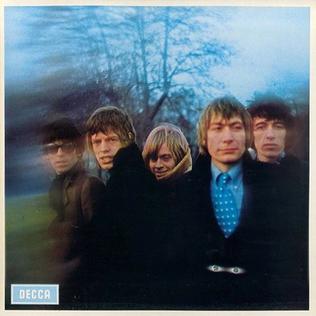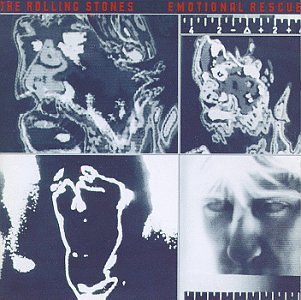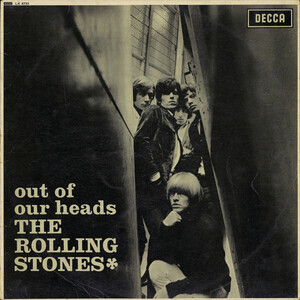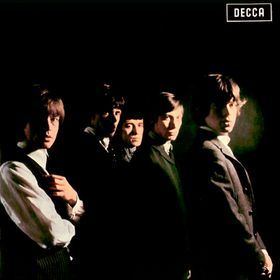
The Rolling Stones are an English rock band formed in London in 1962. Active for over six decades, they are one of the most popular and enduring bands of the rock era. In the early 1960s, the band pioneered the gritty, rhythmically driven sound that came to define hard rock. Their first stable line-up consisted of vocalist Mick Jagger, guitarist Keith Richards, multi-instrumentalist Brian Jones, bassist Bill Wyman, and drummer Charlie Watts. During their early years, Jones was the primary leader. Andrew Loog Oldham became their manager in 1963 and encouraged them to write their own songs. The Jagger–Richards partnership soon became the band's primary songwriting and creative force.

"Jumpin' Jack Flash" is a song by the English rock band the Rolling Stones, released as a non-album single in 1968. Called "supernatural Delta blues by way of Swinging London" by Rolling Stone magazine, the song was seen as the band's return to their blues roots after the baroque pop and psychedelia heard on their preceding albums Aftermath (1966), Between the Buttons (1967) and especially Their Satanic Majesties Request (1967). One of the group's most popular and recognisable songs, it has been featured in films and covered by numerous performers, notably Thelma Houston, Aretha Franklin, Tina Turner, Peter Frampton, Johnny Winter, Leon Russell and Alex Chilton. To date, it is the band's most-performed song; they have played it over 1,100 times in concert.

Their Satanic Majesties Request is the sixth studio album by the English rock band the Rolling Stones, released in December 1967 by Decca Records in the UK and by London Records in the United States. It was the first Rolling Stones album released in identical versions in both countries. The title is a play on the "Her Britannic Majesty requests and requires" text that appeared inside a British passport.

Jamming with Edward! is a 1972 album by three Rolling Stones band members accompanied by Nicky Hopkins and Ry Cooder.

Between the Buttons is the fifth British and seventh American studio album by the English rock band the Rolling Stones, released on 20 January 1967 in the UK and 10 February in the US. Reflecting the band's brief foray into psychedelia and baroque pop balladry during the era, the album is among their most eclectic works; multi-instrumentalist Brian Jones frequently abandoned his guitar during the sessions in favour of instruments such as organ, marimba, dulcimer, vibraphone and kazoo. Keyboard contributions came from two session players: former Rolling Stones member Ian Stewart and frequent contributor Jack Nitzsche. Between the Buttons would be the last album produced by Andrew Loog Oldham, who had, to this point, acted as the band's manager and produced all of their albums.

Emotional Rescue is the fifteenth studio album by English rock band the Rolling Stones, released on 23 June 1980 by Rolling Stones Records. Following the success of their previous album, Some Girls, their biggest hit to date, the Rolling Stones returned to the studio in early 1979 to start writing and recording its follow-up. Full-time members Mick Jagger (vocals), Keith Richards (guitar), Ronnie Wood (guitar), Bill Wyman (bass) and Charlie Watts (drums) were joined by frequent collaborators Ian Stewart (keyboards), Nicky Hopkins (keyboards), Bobby Keys (saxophone) and Sugar Blue (harmonica).

Out of Our Heads is the third studio album by the English rock band the Rolling Stones, released in two editions with different covers and track listings. In the US, London Records released it on 30 July 1965 as the band's fourth American album, while Decca Records released its UK edition on 24 September 1965 as the third British album.

December's Children (And Everybody's) is the fifth American studio album by the English rock band the Rolling Stones, released in December 1965. It is primarily compiled from different released tracks from across the band's recording career up to that point, including the UK version of Out of Our Heads. Bassist Bill Wyman quotes Jagger in 1968 calling the record "[not] an album, it's just a collection of songs." Accordingly, it is only briefly detailed in Wyman's otherwise exhaustive book Rolling with the Stones. It features their then-recent transatlantic hit single "Get Off of My Cloud", as well as their own remake of Marianne Faithfull's Jagger/Richards-penned hit "As Tears Go By", which was released as the album's second single in the US.

The Rolling Stones is the debut studio album by the English rock band the Rolling Stones, released by Decca Records in the UK on 17 April 1964. The American edition of the LP, with a slightly different track list, came out on London Records on 29 May 1964, subtitled England's Newest Hit Makers, which later became its official title.

12 × 5 is the second American studio album by the English rock band the Rolling Stones, released in 1964 following the success of their American debut The Rolling Stones . It is an expanded version of the EP Five by Five, which had followed their debut album in the UK.

Made in the Shade, released in 1975, is the fourth official compilation album by the Rolling Stones, and the first under their Atlantic Records contract. It covers material from Sticky Fingers (1971), Exile on Main St. (1972), Goats Head Soup (1973) and It's Only Rock 'n' Roll (1974).

Five by Five is the second EP by the Rolling Stones and was released in 1964. Captured during a prolific spurt of recording activity at Chess Studios in Chicago that June, Five by Five was released that August in the UK shortly after their debut album, The Rolling Stones, had appeared. The title of Five by Five is a play on words—five tracks recorded by a band with five members.

Flowers is the second compilation album by the Rolling Stones, released in June 1967. The group recorded the songs at various studios dating back to 1965. Three of the songs had never been released: "My Girl", "Ride On, Baby" and "Sittin' on a Fence", the first of which was recorded in May 1965 during the sessions for "(I Can't Get No) Satisfaction", and the other two of which were recorded in December 1965 during the first lot of Aftermath sessions. The rest of the album tracks either appeared as singles or had been omitted from the American versions of Aftermath and Between the Buttons.

Metamorphosis is the third compilation album of the Rolling Stones music released by former manager Allen Klein's ABKCO Records after the band's departure from Decca and Klein. Released in 1975, Metamorphosis centres on outtakes and alternate versions of well-known songs recorded from 1964 to 1970.

Big Hits (High Tide and Green Grass) is the first compilation album by the Rolling Stones. With different cover art and track listings, it was released on 28 March 1966, on London Records in the US and on 4 November 1966, by Decca Records in the UK.

"Mother's Little Helper" is a song by the English rock band the Rolling Stones. A product of Mick Jagger and Keith Richards' songwriting partnership, it is a folk rock song with Eastern influences. Its lyrics deal with the popularity of prescribed tranquilisers like Valium among housewives and the potential hazards of overdose or addiction. Recorded in December 1965, it was first released in the United Kingdom as the opening track of the band's April 1966 album, Aftermath. In the United States, it was omitted from the album and instead issued as a single in July 1966 during the band's fifth American tour. The Rolling Stones' twelfth US single, "Mother's Little Helper" spent nine weeks on the US Billboard Hot 100, peaking at No. 8, and it reached No. 4 on both Record World and Cash Box's charts.

"Heart of Stone" is a song by the English rock band the Rolling Stones, credited to the songwriting partnership of Jagger/Richards. London Records first issued it as a single in the United States in December 1964. The song was subsequently included on The Rolling Stones, Now! and Out of Our Heads.

"The Last Time" is a song by the English rock band the Rolling Stones featuring the Andrew Oldham Orchestra, and the band's first original song released as an A-single in the UK. Written by Mick Jagger and Keith Richards, and recorded at RCA Studios in Hollywood, California in January 1965, "The Last Time" was the band's third UK single to reach number one on the UK Singles Chart, spending three weeks at the top in March and early April 1965. It reached number two in the Irish Singles Chart in March 1965, and was released on the US version of the album Out of Our Heads on 30 July 1965.

"One Hit (To the Body)" is the opening track to the English rock band the Rolling Stones' 1986 album Dirty Work. The song was released as the album's second single on 9 May in the United States and on 19 May in the United Kingdom, with "Fight" as its B-side. It was the first Rolling Stones single to feature a Ron Wood co-writing credit with Jagger and Richards.

"Take It or Leave It" is a song written by Mick Jagger and Keith Richards. It was initially given away by them to the Searchers, a band with declining chart success, in hopes of making them popular again. Pye Records released the single on 8 April 1966 and it peaked at number 31 on the Record Retailer chart in May of that year. Though it was more popular in mainland Europe, the single was their penultimate song to chart. It received mixed reviews in the British Press.




















